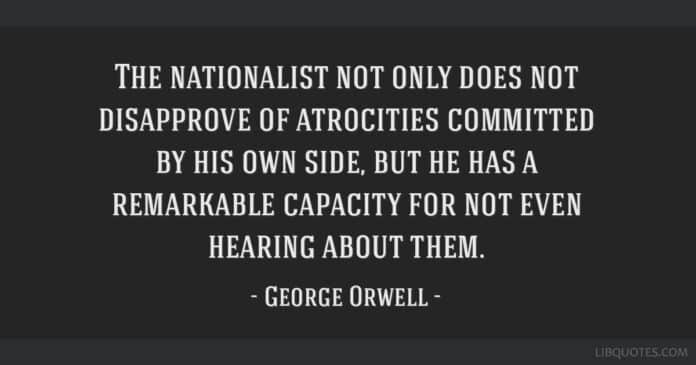Orwell’s essay Notes On Nationalism is as important a read as any at this time. Anyone who reads it and takes time to consider it in relation to their own lives and those of those around them surely cannot fail to see how nationalism overcomes light with shady shadows. It creates a ‘blind loyalty’ to actions and words that are undeserving. It enables a bias that at best distorts and, at worst, entirely replaces reality. It leads to destruction and murder. Physical violence and false ideas of superiority become normalised at the expense of facts and ‘truths’. Lives become lies.
Orwell’s idea of nationalism?
‘By ‘nationalism’ I mean first of all the habit of assuming that human beings can be classified like insects and that whole blocks of millions or tens of millions of people can be confidently labelled ‘good’ or ‘bad’.[1] But secondly—and this is much more important—I mean the habit of identifying oneself with a single nation or other unit, placing it beyond good and evil and recognising no other duty than that of advancing its interests.’
History is littered with the convincing of many to conform to this. To give and take lives. To destroy families and communities… To rupture….
‘Nationalism… is inseparable from the desire for power. The abiding purpose of every nationalist is to secure more power and more prestige, not for himself but for the nation or other unit in which he has chosen to sink his own individuality.’
Conflict leads to war. Taking from and leaving less.
‘The nationalist does not go on the principle of simply ganging up with the strongest side. On the contrary, having picked his side, he persuades himself that it is the strongest and is able to stick to his belief even when the facts are overwhelmingly against him. Nationalism is power hunger tempered by self-deception. Every nationalist is capable of the most flagrant dishonesty, but he is also, since he is conscious of serving something bigger than himself, unshakeably certain of being in the right.’
How many do we know like this? The determination to be wrong whilst believing oneself to be right. How can millions, tens of millions, hundreds of millions of people die violently without this belief?
Try these three questions:
- Which of the three great allies, the U.S.S.R., Britain and the U.S.A., contributed most to the defeat of Germany in WW2?
- Why should the UK maintain sovereignty over the Falkland Islands or Gibraltar when they are both thousands of miles away from its borders?
- What did the EU ever do for the UK?
View each as a nationalist. Then view each as an academic supporting with evidence. Almost certainly the responses will be entirely different. The former will pick and choose facts, and the latter will expose them all in their entirety, no matter where they lead.
‘The following are the principal characteristics of nationalist thought:
Obsession. As nearly as possible, no nationalist ever thinks, talks, or writes about anything except the superiority of his own power unit. It is difficult, if not impossible, for any nationalist to conceal his allegiance. The smallest slur upon his own unit or any implied praise of a rival organisation, fills him with uneasiness, which he can only relieve by making some sharp retort….’
‘Instability. The intensity with which they are held does not prevent nationalist loyalties from being transferable.’ …It makes it possible for him to be much more nationalistic—more vulgar, more silly, more malignant, more dishonest—than he could ever be on behalf of his native country, or any unit of which he had real knowledge….’
‘Indifference to Reality. All nationalists have the power of not seeing resemblances between similar sets of facts….’ E.G. A British Tory will defend self-determination in Europe and oppose it in India with no feeling of inconsistency OR Cromwell’s soldiers slashing Irishwomen’s faces with razors will become morally neutral or even meritorious when it is felt that they were done in the ‘right’ cause.’
‘…Indifference to objective truth is encouraged by the sealing-off of one part of the world from another, which makes it harder and harder to discover what is actually happening….’
The context and essence require the essay and other contributions elsewhere to be read and considered in their entirety. What Orwell, for example, does is help those who want to be helped to live a more honest life.
Honesty about the world in which we reside brings light, whereas lies and deception bring darkness.
Douglas James
Join us in helping to bring reality and decency back by SUBSCRIBING to our Youtube channel: https://www.youtube.com/channel/UCQ1Ll1ylCg8U19AhNl-NoTg SUPPORTING US where you can: Award Winning Independent Citizen Media Needs Your Help. PLEASE SUPPORT US FOR JUST £2 A MONTH https://dorseteye.com/donate/







